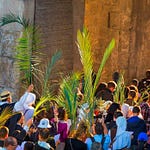This episode addresses conversions to Roman Catholicism, particularly among pastors and elders within the various reformed churches. The argument made is that such conversions aren’t to Rome’s doctrine, but Rome’s culture—and particularly sacramentalism.
Sources:
Eugene Quay, “Justifiable Abortion — Medical and Legal Foundations” (pts. 1 and 2),” The Georgetown Law Journal; Winter 1960 - Spring 1961, Vol. 40, Nos. 2 and 3.
Bio of Effie Quay.
James Buchanan, The Doctrine of Justification
Decrees of Council of Trent.
Excerpts from Calvin’s Institutes concerning infant communion:
CALVIN: Furthermore, they object that there is no more reason to administer baptism to infants than the Lord’s Supper, which is not permitted to them. As if Scripture did not mark a wide difference in every respect! This permission was indeed commonly given in the ancient church, as is clear from Cyprian and Augustine, but the custom has deservedly fallen into disuse. For if we consider the peculiar character of baptism, surely it is an entrance and a sort of initiation into the church, through which we are numbered among God’s people: a sign of our spiritual regeneration, through which we are reborn as children of God. On the other hand, the Supper is given to older persons who, having passed tender infancy, can now take solid food.
This distinction is very clearly shown in Scripture. For with respect to baptism, the Lord there sets no definite age. But he does not similarly hold forth the Supper for all to partake of, but only for those who are capable of discerning the body and blood of the Lord, of examining their own conscience, of proclaiming the Lord’s death, and of considering its power.
Do we wish anything plainer than the apostle’s teaching when he exhorts each man to prove and search himself, then to eat of this bread and drink of this cup? A self-examination ought, therefore, to come first, and it is vain to expect this of infants. Again: “He who eats unworthily eats and drinks condemnation for himself, not discerning the body of the Lord”. If only those who know how to distinguish rightly the holiness of Christ’s body are able to participate worthily, why should we offer poison instead of life-giving food to our tender children? What is that command of the Lord: “Do this in remembrance of me”? What is that other command which the apostle derives from it: “As often as you eat this bread, you will proclaim the Lord’s death until he comes”? What remembrance of this thing, I ask, shall we require of infants when they have never grasped it? What preaching of the cross of Christ, the force and benefit of which their minds have not yet comprehended? None of these things is prescribed in baptism. Accordingly, there is a very great difference between these two signs, as we have noted in like signs also under the Old Testament. Circumcision, which is known to correspond to our baptism, had been appointed for infants. But the Passover, the place of which has been taken by the Supper, did not admit all guests indiscriminately, but was duly eaten only by those who were old enough to be able to inquire into its meaning. If these men had a particle of sound brain left, would they be blind to a thing so clear and obvious?
It troubles me to burden my readers with a heap of trifles. Nevertheless, it behooves us to make short work of the specious reasons which Servetus, not the least among the Anabaptists — indeed, the great glory of that tribe — girding himself for conflict, decided to bring forward...
2. [Servetus] objects, that Christ’s symbols were instituted for remembrance, in order that everyone should remember that he was buried with Christ. I reply that what he has contrived out of his own head needs no refutation; indeed, what he applies to baptism rightly refers to the Sacred Supper, as Paul’s words show: “that each one examine himself”; there is nowhere any such thing said of baptism. From this we conclude that those who, because of their youth, are not yet capable of examination may rightly be baptized...
8. He objects that they must be fed spiritual food if they are new men. The answer is easy: by baptism they are admitted into Christ’s flock, and the symbol of their adoption suffices them until as adults they are able to bear solid food. Therefore, we should wait for the time of examination, which God expressly requires in the Sacred Supper.
9. Afterward, he objects that Christ calls all his people to the Sacred Supper. Yet it is clear enough that he admits none but those who are already prepared to celebrate the remembrance of his death. From this it follows that infants, whom he vouchsafed to embrace, remain in their distinct and proper rank until they grow up, and yet are not strangers. He objects that it is monstrous for a man, after being born, not to eat. I answer: souls are fed in another way than by the outward eating of the Supper; therefore, to infants Christ is nonetheless food, though they abstain from the symbol. But the case is different in baptism, by which only the door into the church is opened to them...
12. He claims further that all Christians are brothers, but that, to us, children are not of that number so long as we keep them away from the Supper. But I return to that principle that only those who are members of Christ are heirs of the Kingdom of Heaven; then Christ’s embrace was the true token of adoption, by which infants are joined in common with adults, and that abstaining from the Supper for a time does not prevent them from belonging to the body of the church. Indeed, the thief converted on the cross did not fail to become a brother of the pious, although he never came to the Supper….
But it is no wonder that those reprobate spirits, as if agitated by a frenzy, drag in the crassest absurdities in defense of their errors. For God justly avenges their pride and obstinacy by such irrationality. I trust I have made plain how weakly Servetus has supported his little Anabaptist brothers. (Institutes; IV.16.30-31)
* * *
Safe Pasture Podcast: feeding the Good Shepherd’s flock.
Intro and outro music is J. S. Bach’s, Sheep May Safely Graze (BWV 208):
Sheep may safely graze and pasture
Where a Shepherd guards them well
By still waters ere he feeds them,
To the fold he gently leads them,
Where securely they may dwell
Safe Pasture is a production of New Geneva Academy. Are you interested in preparing for ordained ministry with pastors? Have a desire to grow in your knowledge and fear of God? Apply at www.newgenevaacademy.com.
Master of Divinity
Bachelor of Divinity
Certificate in Bible & Theology
Groundwork: The Victory of Christ & The Great Conversation
Out of Our Minds audio, artwork, episode descriptions, and notes are property of New Geneva Academy and Warhorn Media.











Share this post